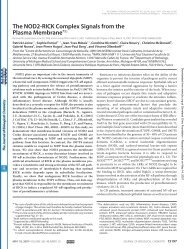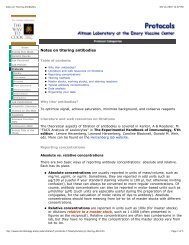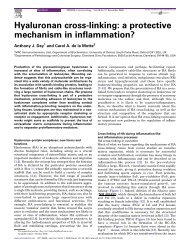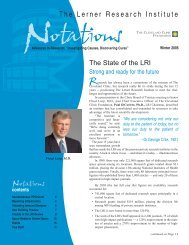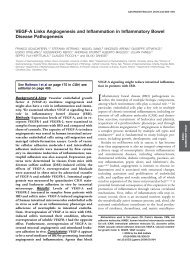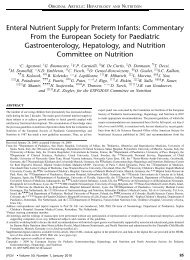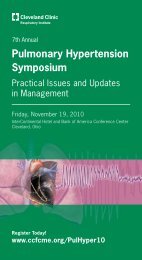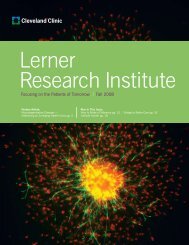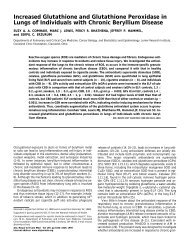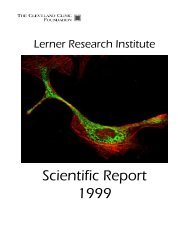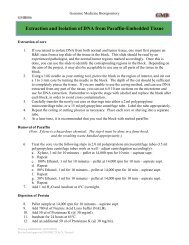Scientific Report 2003-2004 - Cleveland Clinic Lerner Research ...
Scientific Report 2003-2004 - Cleveland Clinic Lerner Research ...
Scientific Report 2003-2004 - Cleveland Clinic Lerner Research ...
- No tags were found...
Create successful ePaper yourself
Turn your PDF publications into a flip-book with our unique Google optimized e-Paper software.
THE YI LABORATORYPOSTDOCTORAL FELLOWSKekke Fan, Ph.D.Jing Li, M.D.TECHNICIANSMingli CaoKundu SumanThe Department of Cancer BiologyPathogenic Role of PTPases in Cancer andAnti-Cancer Activities of PTPase InhibitorsProtein tyrosine phosphatases (PTPases) arekey switches in many important eukaryoticcellular signaling pathways and are tumorsuppressers or anti-oncogenes. Consistent with itsnegative role in signaling, PTPase SHP-1deficiency has been found by us and others incertain human hematopoietic malignancies(polycythemia vera, lymphoma and acuteleukemia) and could be a contributing pathogenicfactor. Certain PTPases may also function asoncogenes. Increased expression of PTPase-alphaand PRLs was associated with late-stage humancolon cancer and caused cell transformation invitro. Amplification of HePTP was detected insome cases of human acute myeloid leukemia.We hypothesize that SHP-1 interacts withand dephosphorylates distinct substrates thatmediate signals of activation,proliferation and differentiation inhematopoietic cells. We have detectedseveral novel SHP-1 substratesinvolved in the growth control ofhematopoietic cells by affinitypurification and mutational analysis.Further characterization of thesesubstrates and determination of theirrole in mitogenic signaling are pivotalin elucidating the mechanisms thatcontrol normal proliferation ofhematopoietic cells. Such efforts will alsoprovide novel insights about the pathogenicprocess of SHP-1 deficiencies in causinghematopoietic diseases.As PTPases play a pivotal role in intracellularsignaling, their inhibitors are expected to havesignificant clinical activities and are targets ofextensive research efforts. Our recent studiesdemonstrated, for the first time, that sodiumstibogluconate is a potent PTPase inhibitor andhas marked anti-cancer activity as a single agentor, more strikingly, in combination with IFNalpha,which is currently used in anti-cancertherapies. Our ongoing studies will furtherexploit its potential as a novel anti-cancer drugand characterize the biologic activities of otherPTPase inhibitors.Taolin Yi, Ph.D.Kant, A.M., De, P., Peng, X., Yi, T., Rawlings, D.J., Kim, J.S., and D.L. Durden (2002) SHP-1 regulatesFcgamma receptor-mediated phagocytosis and the activation of RAC. Blood 100:1852-1859.Yang, W., Tabrizi, M., and T. Yi (2002) A bipartite NLS at the SHP-1 C-terminus mediates cytokineinducedSHP-1 nuclear localization in cell growth control. Blood Cells, Molecules, and Diseases 28:63-74.Joliat, M.J., Lang, P.A., Lyons, B.L., Burzenski, L., Lynes, M.A., Yi, T., Sundberg, J.P., and L.D. Shultz(2002) Absence of CD5 dramatically reduces progression of pulmonary inflammatory lesions in SHP-1protein-tyrosine phosphatase-deficient ‘viable motheaten’ mice. J. Autoimmun. 18:105-117.Pathak, M.K., Hu, X., and T. Yi (2002) Effects of sodium stibogluconate on differentiation and proliferationof human myeloid leukemia cell lines in vitro. Leukemia 16:2285-2291.Yi, T., Pathak, M.K., Lindner, D.J., Ketterer, M.E., Farver, C., and E.C. Borden (2002) Anticanceractivity of sodium stibogluconate in synergy with IFNs. J. Immunol. 169:5978-5985.Pathak, M.K., Dhawan, D., Lindner, D.J., Borden, E.C., Farver, C., and T. Yi (2002) Pentamidine is aninhibitor of PRL phosphatases with anticancer activity. Mol. Cancer Ther. 1:1255-1264.64



